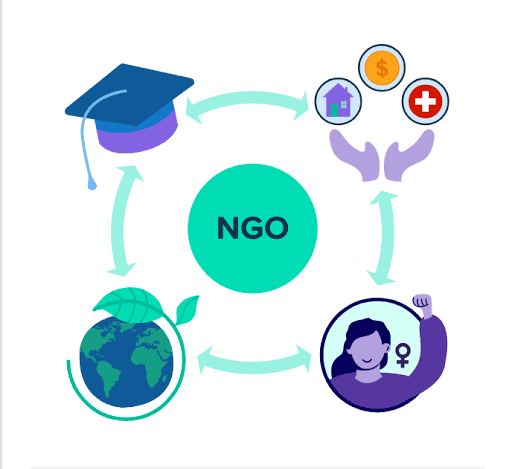Education is cornerstone of societal development. In Nigeria it plays critical role in shaping the future of its young population. Despite the government's efforts to improve the education system, various challenges persist. These include inadequate infrastructure insufficient resources and disparities in access to quality education. Non-Governmental Organizations (NGOs) have emerged as key players addressing these challenges. They support education in Nigeria. This article explores the significant roles that NGOs play in the Nigerian education sector. It assesses their impact. It also examines the challenges they face.
Non-Governmental Organizations are private, non-profit entities. They operate independently of government control. Their primary mission is often to address societal issues and provide services. They advocate for change in areas where government efforts may be limited or lacking. In the context of education NGOs in Nigeria focus on improving access to quality education. They support disadvantaged communities. They also implement innovative educational programs.
Addressing Educational Inequities
One of the major roles of NGOs in Nigeria is to address educational inequities that arise due to socio-economic factors. Many rural and underserved communities face significant barriers to accessing quality education, including lack of schools, inadequate facilities, and limited access to teaching materials. NGOs work to bridge this gap by establishing schools, providing educational materials, and offering scholarships to underprivileged students. For instance, organizations like the Global Partnership for Education and the Borno State Education Trust Fund focus on building and refurbishing schools in areas severely affected by conflict or poverty.
Enhancing Educational Quality
Improving the quality of education is another crucial area where NGOs make a substantial impact. Many NGOs in Nigeria focus on teacher training and professional development to ensure that educators are well-equipped to deliver effective instruction. Programs offered by organizations such as the Educate a Child Initiative and the African Development Foundation provide training workshops for teachers, develop curricula, and introduce innovative teaching methods. By enhancing the skills and knowledge of teachers, these NGOs contribute to better learning outcomes and improved educational standards.
Promoting Gender Equality in Education
Gender disparity remains a significant challenge in Nigerian education, with girls often facing more obstacles to accessing education than boys. NGOs play a vital role in promoting gender equality by implementing programs specifically designed to support female education. Initiatives such as the Malala Fund and Girls Education Project focus on increasing school enrollment rates for girls, providing menstrual hygiene products, and raising awareness about the importance of female education. These efforts help to reduce dropout rates among girls and empower them to pursue education and career opportunities.
Supporting Vulnerable and Marginalized Groups
NGOs also focus on supporting vulnerable and marginalized groups, including children with disabilities, internally displaced persons (IDPs), and those affected by conflict or natural disasters. Organizations like the Nigerian Association of Special Education Teachers and the United Nations Children's Fund (UNICEF) work to ensure that children with disabilities receive inclusive education and access to necessary resources. Additionally, NGOs provide educational support to IDP children, helping them to continue their studies despite being displaced from their homes.
Implementing Innovative Educational Programs
Innovation in education is crucial for addressing contemporary challenges and preparing students for the future. NGOs in Nigeria are at the forefront of implementing innovative educational programs and leveraging technology to enhance learning. Programs such as the Bridge International Academies and the African Institute for Mathematical Sciences (AIMS) introduce new teaching methodologies, digital learning platforms, and STEM (Science, Technology, Engineering, and Mathematics) education initiatives. These innovations help to modernize the education system and provide students with the skills needed for the 21st century.
Advocacy and Policy Influence
Beyond direct educational interventions, NGOs also play a significant role in advocacy and policy influence. They work to raise awareness about educational issues, engage with policymakers, and promote reforms that improve the education system. Organizations such as the Nigeria Education Advocacy Network (NEAN) and the Education Rights Campaign (ERC) advocate for increased funding for education, better educational policies, and greater accountability in the education sector. Through their advocacy efforts, NGOs help to shape the national education agenda and drive positive change.
Challenges Faced by NGOs in Education
While NGOs contribute significantly to the education sector in Nigeria, they also face several challenges. One of the primary obstacles is limited funding and resources. Many NGOs rely on donations, grants, and sponsorships to fund their programs, and securing consistent financial support can be challenging. Additionally, operational challenges such as logistical issues, bureaucratic red tape, and security concerns, particularly in conflict-affected areas, can hinder the effective implementation of educational initiatives.
Another challenge is ensuring sustainability and long-term impact. While NGOs can make substantial contributions in the short term, ensuring that their programs have lasting effects requires ongoing support, collaboration with local communities, and integration with government initiatives. Building partnerships with local stakeholders, including schools, community leaders, and government agencies, is essential for achieving sustainable outcomes and maximizing the impact of NGO interventions.
Conclusion
Non-Governmental Organizations play a vital role in supporting education in Nigeria by addressing educational inequities, enhancing the quality of education, promoting gender equality, and supporting vulnerable groups. Their innovative programs and advocacy efforts contribute to improving access to education and driving positive change in the education sector. Despite facing challenges such as limited funding and sustainability concerns, NGOs continue to make significant strides in transforming the educational landscape in Nigeria. As the education sector evolves, the collaboration between NGOs, government agencies, and local communities will be crucial in achieving long-term educational goals and ensuring that every child in Nigeria has the opportunity to succeed.
